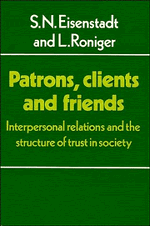Book contents
- Frontmatter
- Contents
- Preface
- 1 PERSONAL RELATIONS, TRUST AND AMBIVALENCE IN RELATION TO THE INSTITUTIONAL ORDER
- 2 THE CONSTRUCTION OF TRUST IN THE SOCIAL ORDER AND ITS AMBIVALENCES: VIEWED FROM THE DEVELOPMENT OF SOCIOLOGICAL THEORY
- 3 THE STRUCTURING OF TRUST IN SOCIETY: UNCONDITIONALITIES, GENERALISED EXCHANGE AND THE DEVELOPMENT OF INTERPERSONAL RELATIONS
- 4 THE BASIC CHARACTERISTICS AND VARIETY OF PATRON–CLIENT RELATIONS
- 5 THE CLIENTELISTIC MODE OF GENERALISED EXCHANGE AND PATRON–CLIENT RELATIONS AS ADDENDA TO THE CENTRAL INSTITUTIONAL NEXUS
- 6 THE SOCIAL CONDITIONS GENERATING PATRON–CLIENT RELATIONS
- 7 VARIATIONS IN PATRON–CLIENT RELATIONS
- 8 RITUALISED INTERPERSONAL RELATIONS; PRIVACY AND FRIENDSHIP
- 9 CONCLUDING REMARKS: THE DIALECTICS OF TRUST AND THE SOCIAL ORDER
- Notes
- Index
5 - THE CLIENTELISTIC MODE OF GENERALISED EXCHANGE AND PATRON–CLIENT RELATIONS AS ADDENDA TO THE CENTRAL INSTITUTIONAL NEXUS
Published online by Cambridge University Press: 01 June 2011
- Frontmatter
- Contents
- Preface
- 1 PERSONAL RELATIONS, TRUST AND AMBIVALENCE IN RELATION TO THE INSTITUTIONAL ORDER
- 2 THE CONSTRUCTION OF TRUST IN THE SOCIAL ORDER AND ITS AMBIVALENCES: VIEWED FROM THE DEVELOPMENT OF SOCIOLOGICAL THEORY
- 3 THE STRUCTURING OF TRUST IN SOCIETY: UNCONDITIONALITIES, GENERALISED EXCHANGE AND THE DEVELOPMENT OF INTERPERSONAL RELATIONS
- 4 THE BASIC CHARACTERISTICS AND VARIETY OF PATRON–CLIENT RELATIONS
- 5 THE CLIENTELISTIC MODE OF GENERALISED EXCHANGE AND PATRON–CLIENT RELATIONS AS ADDENDA TO THE CENTRAL INSTITUTIONAL NEXUS
- 6 THE SOCIAL CONDITIONS GENERATING PATRON–CLIENT RELATIONS
- 7 VARIATIONS IN PATRON–CLIENT RELATIONS
- 8 RITUALISED INTERPERSONAL RELATIONS; PRIVACY AND FRIENDSHIP
- 9 CONCLUDING REMARKS: THE DIALECTICS OF TRUST AND THE SOCIAL ORDER
- Notes
- Index
Summary
THE CLIENTELISTIC MODE OF GENERALISED EXCHANGE IN COMPARATIVE PERSPECTIVE
What is meant by clientelistic relations constituting the core of a central mode of societal institutional structure, of regulation of the flow of resources in society, of construction of trust and generalised exchange within it, or, in other words, of institutional integration? And how can such a clientelistic mode be distinguished from other modes of regulation of the institutional structure?
In any concrete social setting – a society or a sector thereof – diverse modes of construction of trust are usually operative in relation to the division of labour in society, and to the regulation of power manifest in the structuring of generalised exchange and in its institutional implications. In a concrete society, such modes assume differing importance and, although one of them usually predominates, conflicts may quite often develop between it and the others. But, in principle, such modes can be differentiated, as they entail specific modes of construction of basic aspects of the social structure – particularly the structure of the social hierarchies and the flow and conversion of resources in relation to the construction of trust and meaning of generalised exchange in society.
- Type
- Chapter
- Information
- Patrons, Clients and FriendsInterpersonal Relations and the Structure of Trust in Society, pp. 166 - 202Publisher: Cambridge University PressPrint publication year: 1984



